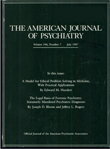On wearing two hats: role conflict in serving as both psychotherapist and expert witness
Abstract
OBJECTIVE: This article explores the clinical, legal, and ethical problems that typically occur when a psychotherapist serves as both a treating clinician and forensic evaluator (or expert witness) in the same case. METHOD: The professional literature, ethics codes, opinion surveys, and the changing economic and institutional contexts of psychotherapy are reviewed in order to identify obstacles to widespread recognition of this straightforward ethical issue. The processes of psychotherapy and forensic evaluation are then analyzed so as to reveal fundamental incompatibilities between the psychotherapist's clinical and legal functions. RESULTS: Attempting to treat and evaluate the same person typically creates an irreconcilable role conflict. This role conflict manifests itself in different conceptions of truth and causation, different forms of alliance, different types of assessment, and different ethical guidelines. CONCLUSIONS: Although circumstances sometimes compel a practitioner to assume the dual role of treater and evaluator, the problems that surround this practice argue for its avoidance whenever possible.



